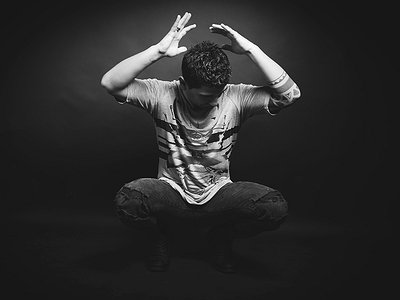Part 2
It has today almost become customary to radically change pieces in the act of mixing and to increase the creative input of the DJ even to the level of the actual composition. What's your take on that and in how much do you make use of these possibilities yourself?
Personally I think it's great. I'm using al ot of fxs while playing for example. We are not radio DJs, we are club DJs and we need to use any tool we find inspiring to be individuals as artists. Each DJ has his own way of playing records and I'm all for using the music and the relevant tools to re-define yourself while DJing .
One of the most important aspects of a DJ set are the transitions from one track to the next. What makes a transition successful from your perspective?
I don't think we can judge a transition without listening to the next one. Every track is a chapter in a story you're trying to tell as an artist and you cannot judge a chapter before finishing the book - or the “DJ set” in this case. Personally, I enjoy listening to DJs who play rough on the console, when the buildup is more raw and fast, rather slow and long .. Maybe it's because I personally don’t like to delay satisfaction .. I aim for every track to bring something to the table. Better to get the legs traveling for a couple of hours than making them run. It's just boring me out.
How do you see the balance between giving the crowd what they want and treating them to something new? What's your take on the idea of the DJ as an "educator" and is the relationship with the dancers a collaborative one or, as Derrick May once put it, a “battle”?
I think every DJ needs to be a clubber first. I spent all my youth as a promoter while I was a bedroom DJ and used to go clubbing and dancing like crazy with my friends. These experiences still help me communicate with the crowd while playing out today. Yes, it is a battle, but mainly between me and myself. It's also a collaboration and many other things. In the end, I just put myself out there, without any further thoughts, going with the feeling and rhythm. The crowd can't have fun if you're not …
On the other hand, I obviously keep those special records for the special moments I crave for. I don't think there is any DJ, at least not an international one, who can really only play what he wants.
It is customary for many DJs to also produce tracks of their own, thereby lifting the former 'division of labor' between the two. How do you feel about this – and in which way can both sides benefit from this? How does your work as a DJ influence your studio productions and vice versa?
Not every DJ also has to be a producer. But if he wants make it out there these days, in the social media age, he needs to present something that establishes his own identity. Personally, I think producing made me a much better DJ. You learn to understand the music better, you can connect to it in a better way when you understand the basics. You know how to divide it and control it completely.
With more and more musicians creating than ever and more and more of these creations being released, what does this mean for you as an artist in terms of originality? What are some of the areas where you currently see the greatest potential for originality and who are some of the artists and communities that you find inspiring in this regard?
I think been original is something that comes naturally. You can't sit in the studio and decide to be “original“ or unique .. It's a way of life, a way of thinking. If you're a unique mind in the real world, it will reflect automatically in the studio. If you're not, there's no way of forcing it. The way a producer sees and hears the music, twists his fingers on the knobs or arranges his tracks is an automatic response from the smallest nerves in his soul. I can find originality in many artists out there, some of my favourites are Eduardo de la Calle, Markus Suckut, Burial , Martyn and more.
Reaching audiences usually involves reaching out to the press and possibly working with a PR company. What's your perspective on the promo system? In which way do music journalism and PR companies change the way music is perceived by the public?
In Rome do as the Romans do. That's one way anyway. It's definitely not only about the music anymore. As you've described, things have changed over the past 10 years. With the social media growing and the importance of Internet exposure, to go from a momentary exposure to a mega one, you need help from the experts. It's a natural evolution and I'm accepting it and embracing it when required. It helps that there are many sub genres and new talents – all of this is important for the industry.
It is remarkable, in a way, that DJing has remained relevant for such a long time. Do you nonetheless have a vision of DJing, an idea of what it could be beyond its current form?
That's a very interesting issue, fascinating indeed. The only thing that has genuinely changed in being a DJ is the different format (s)he plays with and the recognition Djs get these days, which has nearly reached the level of pop stars. But the actual work remain the same. I guess that a DJ is not only an entertainer anymore, he is also an influencer and a musician, which wasn't the case 20 years ago.
I think that in 20 years from now, DJs will have to be very creative and unique in order to beat the machines.
Read more about Shlomi Aber on his personal website.






